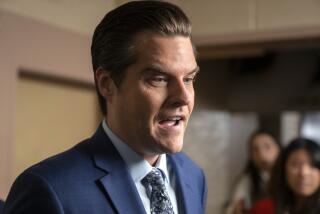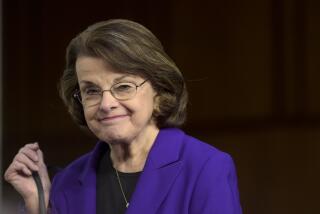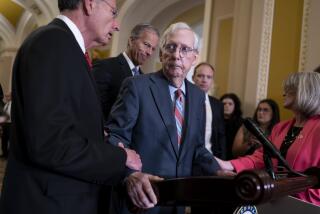Senate Duo Personifies Bipartisanship
- Share via
WASHINGTON — John McCain, America’s most famous ex-POW, was livid.
Across the Senate floor was Russell D. Feingold, the chamber’s most junior Democrat and a liberal to boot, a man with no military experience who was trying to kill funding for a nuclear-powered aircraft carrier to be named the Ronald Reagan.
“Have you ever even been on one?” blurted McCain (R-Ariz.), a rock-ribbed conservative and a Navy fighter pilot during the Vietnam War.
“Well, nooooo,” a sheepish Feingold (D-Wis.) admitted.
Curtly, McCain advised Feingold to “learn more about it” before trying to shut it down.
But from that rocky start four years ago, McCain and Feingold have become a quintessential odd couple on Capitol Hill, forging an unlikely alliance to lead successful drives to ban most gifts to members of Congress and to require unprecedented disclosure by lobbyists.
Now they’re at it again, comrades-in-arms in a determined effort to root out billions of dollars in “pork” spending and, more notably, to rewrite the nation’s campaign-finance laws in the wake of the fund-raising scandal now shaking the Democratic Party.
The McCain-Feingold partnership represents more than just a striking example of strange political bedfellows. It illuminates how mutual respect and concern for the commonweal can triumph over ideology and partisan politics--and lay the groundwork for significant congressional action.
The curious alliance took root several days after the GOP won control of the Senate in 1994. Out of the blue, McCain called Feingold to suggest that, despite their very different underlying philosophies, they might work together to improve “the system.”
“What impressed me was his integrity and his commitment to reform. He was a man that I felt I could work with,” McCain, 60, said of the 43-year-old first-term senator with a crew cut and the studious mien of a Boy Scout.
Feingold was surprised--and delighted--by McCain’s call. “Here I was, the last guy on the totem pole. And he, the new-majority guy, wanted to work with me.
“I think we both share a real gut feeling that it’s embarrassing, really, the way the finances of the country are handled and the fact that there’s just too much money corrupting the process. So it’s not really political ideology.”
It also helped that the two men share a willingness to go against the grain, embracing unpopular stands even if that means taking heat from members of their own party and the White House.
“If you don’t do anything controversial, you’re not doing your job,” Feingold said. “I absolutely believe that.”
*
Congressional odd couples are rare. Typically, they arise when politicians join to work on a specific matter, and the effort usually doesn’t last beyond the issue at hand.
For instance, Sens. Edward M. Kennedy (D-Mass.) and Strom Thurmond (R-S.C.) teamed up once to help create the U.S. Sentencing Commission. Kennedy also worked with then-Sen. Dan Quayle (R-Ind.) to create a job-training program for high school students. And Sen. John D. “Jay” Rockefeller IV (D-W. Va.) linked up with Sen. Slade Gorton (R-Wash.) in the last Congress to champion a GOP product-liability reform bill, which was vetoed by Clinton last spring.
The McCain-Feingold partnership is “not just one of those relationships of convenience,” said Norman Ornstein, a congressional analyst at the American Enterprise Institute, a conservative think tank in Washington. “Both men want to make things happen.”
That they are so different may actually enhance their collaborative efforts, Ornstein said. Whereas many politicians with much in common--including some from the same state--do not get along, “when you have two opposites, like McCain and Feingold, sometimes they are much closer--because basically, they are not threats to one another.”
Their latest collaboration, the McCain-Feingold campaign-finance reform bill, has won the strong backing of Clinton but faces significant bipartisan opposition in both houses of Congress. It would create voluntary campaign-spending limits. Candidates who comply with the limits and who agree to raise 60% of their campaign funds from within their state would receive free television time and discounted postal rates. The bill would also ban political action committee contributions to federal candidates.
If enacted, it would represent the most significant campaign-finance reform legislation of the post-Watergate period.
Aside from their passion to reform the system, McCain and Feingold couldn’t be more different.
Feingold comes right out of Wisconsin’s progressive tradition. He grew up in Janesville, a small town where his father practiced law but breathed and lived politics, presiding over dinner table conversations that rarely strayed from politics or religion. (Feingold’s sister became Wisconsin’s first female rabbi.)
In 1960, young Russ was crushed after learning that he was the only student in his second-grade class to support John F. Kennedy in a mock election.
A high school debate champion, Feingold attended Oxford University as a Rhodes scholar after graduating from the University of Wisconsin. He earned a degree from Harvard Law School in 1979.
After that, Feingold joined a Madison law firm and practiced civil litigation, including 1st Amendment law.
In 1982, he won a state Senate seat, defeating an aging GOP incumbent by 31 votes out of 47,000 cast--the closest contest in Wisconsin history. Feingold earned a reputation as a squeaky-clean politician who shunned nasty campaign tactics and would not even accept a cup of coffee from lobbyists.
Ten years later, at age 39, he defeated another incumbent Republican, Sen. Robert W. Kasten Jr. However, the victory made him the lowest-ranking Democrat in the U.S. Senate and 98th in overall seniority in the chamber.
In that year’s Democratic primary, Feingold bested two rivals who had more money and name recognition. But as they viciously attacked one another, Feingold aired clever and humorous ads that won wide acclaim. One trumpeted an endorsement by Elvis Presley; another had Feingold conducting a tour of his ranch home--at one point flinging open a closet door as he declared: “No skeletons.”
Feingold also touted an 82-point deficit-reduction plan (which he brought to Washington), and painted on his garage doors in bold letters his “contract” with the electorate, vowing to spurn pay raises and to continue living in Madison, among other things.
*
In Washington, Feingold fought against the North American Free Trade Agreement, one of Clinton’s priorities. He stood virtually as the lone dissident in late 1994 amid a bipartisan post-election bidding war to enact a broad tax cut; eventually, he prevailed as Democrats began attacking Republicans for seeking a tax cut while reducing Medicare spending.
Overall, Feingold has a liberal voting record on social issues and a moderately conservative one on fiscal matters. Among the spending programs he has attacked are Radio Free Europe/Radio Liberty, a proposed atom smasher and subsidies to various industries.
“I was very aware that he comes from a liberal state, has a liberal background,” McCain said. “But that didn’t concern me. The issues that I wanted to work with him on were the issues of giving the American people the kind of integrity and decent conduct of government that they have every right to expect.”
McCain also appreciated Feingold’s “willingness to stand up for what he believed in--even if that wasn’t the view of the majority of his party or even the leadership of his party.”
The same is true of McCain.
In addition to championing campaign-finance reform--an unpopular stance among many of his GOP colleagues--McCain defied then-President Reagan by opposing the deployment of Marines to Lebanon, which resulted in the terrorist bombing of their barracks in Beirut.
*
The son and grandson of Navy admirals, McCain spent more than five years as a prisoner of war in Hanoi, where he was tortured and kept in solitary confinement for two years.
In the same year that Feingold won his state Senate seat, McCain was elected to the House of Representatives. Four years later, in 1986, he was elected to the Senate.
There, McCain’s storied career was tarnished in 1991 by the Lincoln Savings & Loan scandal, although he was ultimately found to have done no more than “exercise poor judgment” by interceding with government regulators on behalf of Charles H. Keating Jr., the S&L; owner.
McCain nevertheless won a second term the following year.
That brush with political extinction, McCain said, “made me more aware that you’ve got to do what you can while you can. . . . Nobody’s here forever.”
Despite his support for nuclear-powered aircraft carriers, McCain is no knee-jerk backer of all things military. He opposed projects like the Sea Wolf submarine and the B-2 bomber. He also has sought to eliminate special parking spaces at Washington’s National Airport for members of Congress, a position that won him few friends on Capitol Hill.
McCain has, however, developed a close relationship with Sen. John Kerry (D-Mass.), another decorated Vietnam War veteran who became a leader in the anti-war movement during the ‘70s.
“The one thing I’ve learned in the Senate is, first, you need to get people’s respect--and then their affection. And the only way you’re going to be effective is to have their respect,” McCain said.
Another lesson: “If you’re going to succeed, then you have to have an element of bipartisanship so that you can convince colleagues on both sides of the aisle that you’re not seeking an advantage.”
That theory passed the test with flying colors in 1995 when the Senate took up the McCain-Feingold proposal to severely limit free meals, complimentary tickets, expenses-paid vacations and other gifts that members may receive.
“There were colleagues on both sides of the aisle who resisted that measure. But when Russ and I were together and said: ‘Look, we’re in agreement on this,’ the force of our arguments were magnified dramatically,” McCain recalled.
Against initially long odds, the gift ban sailed through the Senate--unanimously.
Feingold expressed hope that more such odd-couple alliances can be forged--for the country’s sake.
“I have this feeling that people don’t try. I think we’re trained to not do this,” he said.
His collaboration with McCain, Feingold added, already has become “one of the greatest pleasures I’ve had as a public servant,” marveling at what he already has accomplished by working with someone “who I disagree with on almost everything.”
Feingold concluded:
“You can be the most conservative guy and the most liberal guy, but if you come together on a concept--even if your long-term goals may be different--you can still accomplish something positive for the country. I think we need to encourage that.”
More to Read
Get the L.A. Times Politics newsletter
Deeply reported insights into legislation, politics and policy from Sacramento, Washington and beyond. In your inbox twice per week.
You may occasionally receive promotional content from the Los Angeles Times.










